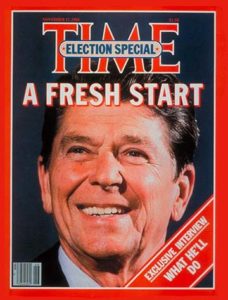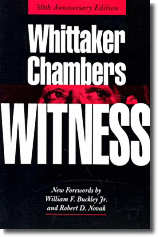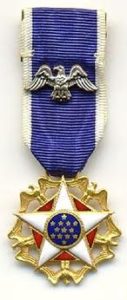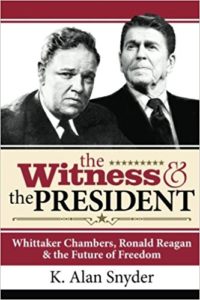Why did I write a book comparing Ronald Reagan and Whittaker Chambers? May I provide some history on that?
 I came of age politically in the 1980s. After suffering through Richard Nixon’s Watergate, Gerald Ford’s caretaker presidency, and Jimmy Carter’s near-total ineptitude, I looked upon Reagan’s inauguration as a fresh start for America. Even Time magazine, in its cover story, seemed to agree with that assessment.
I came of age politically in the 1980s. After suffering through Richard Nixon’s Watergate, Gerald Ford’s caretaker presidency, and Jimmy Carter’s near-total ineptitude, I looked upon Reagan’s inauguration as a fresh start for America. Even Time magazine, in its cover story, seemed to agree with that assessment.
I followed political developments closely. This corresponded with working on my master’s degree and then my doctorate in history.
As a strong conservative, I rejoiced in what Reagan accomplished, while sometimes fearing he was becoming too squishy in his dealings with the USSR. Hindsight shows I was wrong to fear that. He knew what he was doing in helping bring down the Evil Empire.
 At the same time, as I proceeded through my higher education, I read for the first time a book that had been recommended to me time and again: Witness by Whittaker Chambers.
At the same time, as I proceeded through my higher education, I read for the first time a book that had been recommended to me time and again: Witness by Whittaker Chambers.
I was mesmerized by the masterful writing, the poignant life story laid out within, and the message of the Christian response to the evils of communism.
So impressed was I by what Chambers had written that I began to include Witness in courses I taught. Further, I learned of the link between Chambers and Reagan, how reading Witness showed Reagan the reason why communism became attractive to people.
Chambers’s hard life, both in and out of communism, impacted Reagan to the point that he could quote portions of Witness from memory. When I went to the Reagan Library, I saw in the speechwriting files Reagan’s own handwritten annotations for inserting quotes from Chambers in his speeches.
 During his presidency, Reagan also awarded Chambers, posthumously, the Presidential Medal of Freedom for his contribution to the advancement of American liberty.
During his presidency, Reagan also awarded Chambers, posthumously, the Presidential Medal of Freedom for his contribution to the advancement of American liberty.
In his remarks on Chambers, Reagan noted,
“At a critical moment in our Nation’s history, Whittaker Chambers stood alone against the brooding terrors of our age. Consummate intellectual, writer of moving, majestic prose, and witness to the truth, he became the focus of a momentous controversy in American history that symbolized our century’s epic struggle between freedom and totalitarianism, a controversy in which the solitary figure of Whittaker Chambers personified the mystery of human redemption in the face of evil and suffering.
As long as humanity speaks of virtue and dreams of freedom, the life and writings of Whittaker Chambers will ennoble and inspire. The words of Arthur Koestler are his epitaph: ‘The witness is gone; the testimony will stand.'”
I also became aware of the key difference between Reagan and Chambers: the former was a supreme optimist with respect to the future of freedom, while the latter despaired that Western civilization would ever learn its lesson and freedom would be eclipsed.
The question then arose in my mind: who was closer to the truth? Is freedom/liberty the inevitable outworking of God’s design for man, or will man’s sinfulness inevitably lead to the collapse of freedom?
Was Reagan correct when he said that Marxism contained the seeds of its own destruction? Was Chambers right when he told his wife, upon leaving communism, that they were now joining the losing side?
Overall, was communism the real problem or was it something deeper—namely, the exaltation of man over God? Was communism perhaps only one manifestation of that deeper problem? Even if communism were to fall, would that really signal a brighter future for freedom?
 All of those issues are what led me to research and write The Witness and the President. My research for this book was extensive. I’ve read everything Chambers wrote—all of his essays, his posthumous book Cold Friday, and letters to friends.
All of those issues are what led me to research and write The Witness and the President. My research for this book was extensive. I’ve read everything Chambers wrote—all of his essays, his posthumous book Cold Friday, and letters to friends.
For Reagan, I read every speech he gave as president, as well as nearly every book on the market dealing with his life, both his background and his beliefs.
Both Reagan and Chambers based their beliefs about the future of freedom on their Christian faith, so the book is replete with an examination of their faith as well as how that played out in their outlook.
The book is endorsed by some excellent and renowned Reagan and Chambers scholars. Dr. Paul Kengor, a prolific author himself and expert on Reagan, wrote the foreword. Dr. George Nash, the preeminent scholar of America conservatism, also gave it an enthusiastic review. Richard Reinsch, author of a study of Chambers’s philosophy, and Dr. Luke Nichter, co-editor of volumes on the Nixon tapes, add their positive commentary as well.
All that to say, I believe I’ve offered in this book a unique comparative biography that will shed light on these two conservative icons. I’m hopeful that this short history of how this book came into being will inspire you to purchase a copy yourself. You can do that by going to this Amazon page.
You can also view my Facebook page dealing with the book and see what I’ve posted there. My sincere desire is to get the message out, a message that will challenge you perhaps, and that will make you think more deeply about the nature of man and the future of our civilization.
